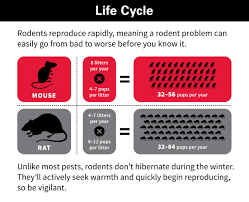HISTORY OF RODENT ...

DIFFERENT BETWEEN ROOF RATS, NORWAY RATS AND HOUSE MICE ...
1) ROOF RATS ( Rattus rattus)
The
1999 species of rodents, in 431 genera and 28 families, described to date
possess a characteristic dentition. Accounting for more than 40% of all
mammalian species, rodents are found throughout the world in a wide range of
habitats: forests, deserts, mountains, the high artic tundra, and often in
close contact with humans.
WHAT IS RODENT ???
Rodents are mammals they are characterized by a singer pair of continuosly growing incisors in each of the upper and lower jaws. Rodents
are warm-blooded mammals that, like humans, can be found throughout the world.
They have oversized front teeth for gnawing and check teeth, which are adapted
for chewing. Rodents chew on a variety of items available to them and
cause great damage in and around homes. They carry many type of disease. Rodents also dangerous for human can cause death and also direct and indirect transmitted. Species of rodents most are Roof rats ( Rattus rattus), Norway rats ( Rattus norvegicus), and House mice ( Mus musculus). These rodents are commensal because they tend to live in close proximity to humans and eat the same food. They destroyed property, frighten people and compete with human for food.
LIFE CYCLE OF RODENTS ...DIFFERENT BETWEEN ROOF RATS, NORWAY RATS AND HOUSE MICE ...
1) ROOF RATS ( Rattus rattus)
- sometimes called black rats.
- slightly smaller than Norway rats
- tails are longer than their heads and bodies combined.
- very agile climbers and usually live and nest above ground in shrubs, trees, and dense vegetation such as ivy.
- sometimes called brown or sewer rats.
- burrows found along building foundations, beneath rubbish or woodpiles, and in moist areas in and around gardens and fields.
- Nests may be lined with shredded paper, cloth, or other fibrous material.
- When Norway rats invade buildings, they usually remain in the basement or ground floor.
HOW TO CONTROL THE RODENTS ???
Rodents and habits can make them challenging to control, and they present a serious menace to your home. If you’re in need of rodent control services, here’s what you should know about these pests :
1) USING RODENT BAITS
When baiting initially, try not to disturb their
original habitats or they may run to another area. After baiting has begun,
continue with sanitation procedures, food source removal, and harborage removal
to ensure additional rodents from nearby areas are not attracted to your
location
2) USING RODENTS TRAP
If you have rats, and choose mice traps the traps would be too small. If you have mice, and choose rat traps, the traps would be too small.
Watching the information of rodents, have a tips and know about life rodent in environment.
It is a good information
Happy Watching
: )
REFERENCES ...